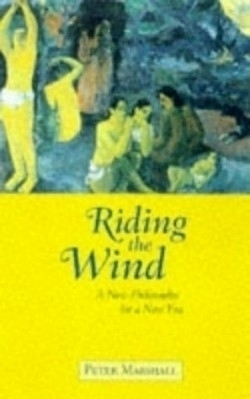Riding the Wind
With the title itself indicative of the philosophical and ecology-minded wellspring which feeds Riding the Wind, author Peter Marshall borrows ancient insights and introduces a modern, cautionary interpretation. With this latest effort, Marshall adds to his repertoire of politically and ecologically grounded works a book that contemplates humanity’s precarious balance on the threshold of a new era-celebratory of its potential, fearful of its complacency.
Marshall’s piece ambitiously sweeps a broad range of focal points and perspectives-the birth of the universe as maintained by ancient Hindu, Taoists, Judaeo-Christians and the chalk-dusted physicist. The book asserts the virtuous existence of a universal web of dependent interconnectedness between space and Earth, Earth and her inhabitants, and the relationships between themselves and others; “…the microcosm of humanity mirrors the macrocosm of the universe. There are galaxies within our bodies as well as outside them. We humans are stardust, evolutionary marvels within the evolving universe.”
Marshall examines Western civilization’s preoccupation with consumerism and artificial wealth in relation to the staggering growth rate of depressives and the fragmented self-worth of humans divorced of their humanity. Employing this holistic philosophy, Marshall lays the groundwork and calls for a restructuring of society and of the human consciousness if we are to successfully portage this rocky transition between millennia. Beneath an umbrella of libertarian ideology, the author avidly describes a near utopian existence, where humans are free to flourish and reach their personal potentials, and ecological soundness of the planet is assured. He believes that relieved of the “artificial restrictions of government and the state, without the coercion of imposed authority,” these ideals are in reach. This vision of the future with a decentralized government, a society flirting with anarchy, dominates the second half of the book and may alienate some readers or undermine any previous chapter’s impact.
Chapters pelt the reader with insights relentlessly; concepts and opinions are often repetitious or lost in the fervor of the author’s anxious pen. This does, however, work to the advantage of the material as it often allots a sense of urgency and informal honesty. Perhaps designed and best suited for those with profound ecological and philosophically spiritual interest, Riding the Wind provides a thought-provoking cascade of insight, which is invaluable to any audience. It is, after all, the vast diversity of opinion and foreign iambic line of thought which insures safe awakening from the threat of complacent slumber.
Reviewed by
Karen Wyckoff
Disclosure: This article is not an endorsement, but a review. The publisher of this book provided free copies of the book to have their book reviewed by a professional reviewer. No fee was paid by the publisher for this review. Foreword Reviews only recommends books that we love. Foreword Magazine, Inc. is disclosing this in accordance with the Federal Trade Commission’s 16 CFR, Part 255.

